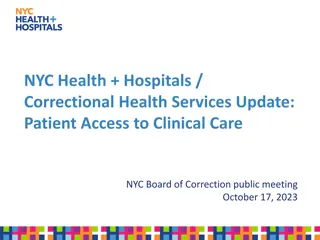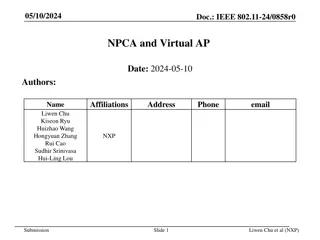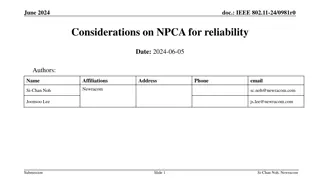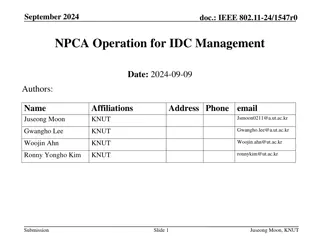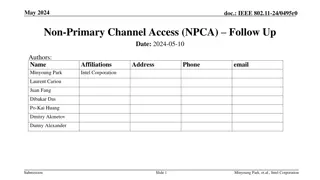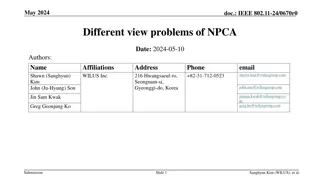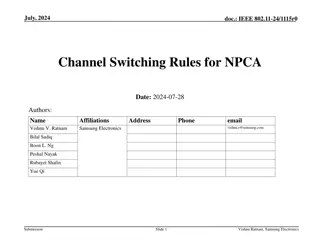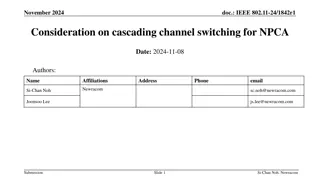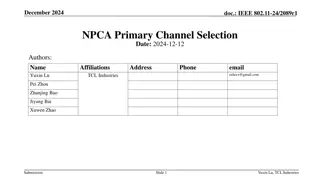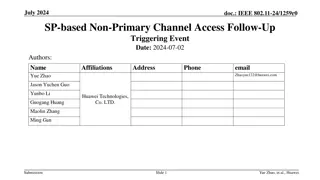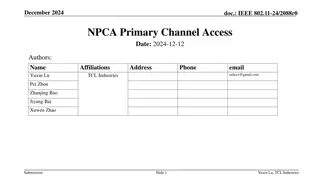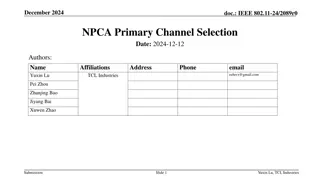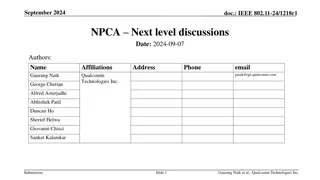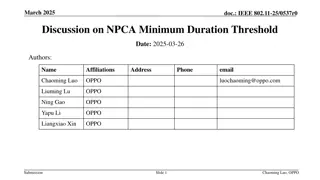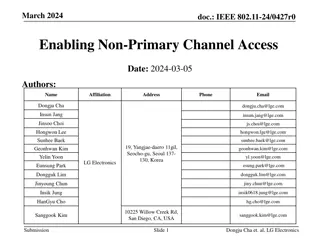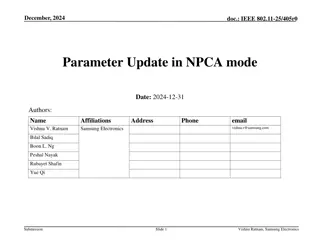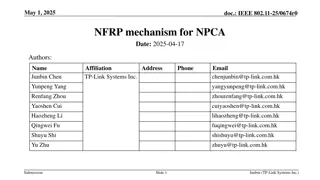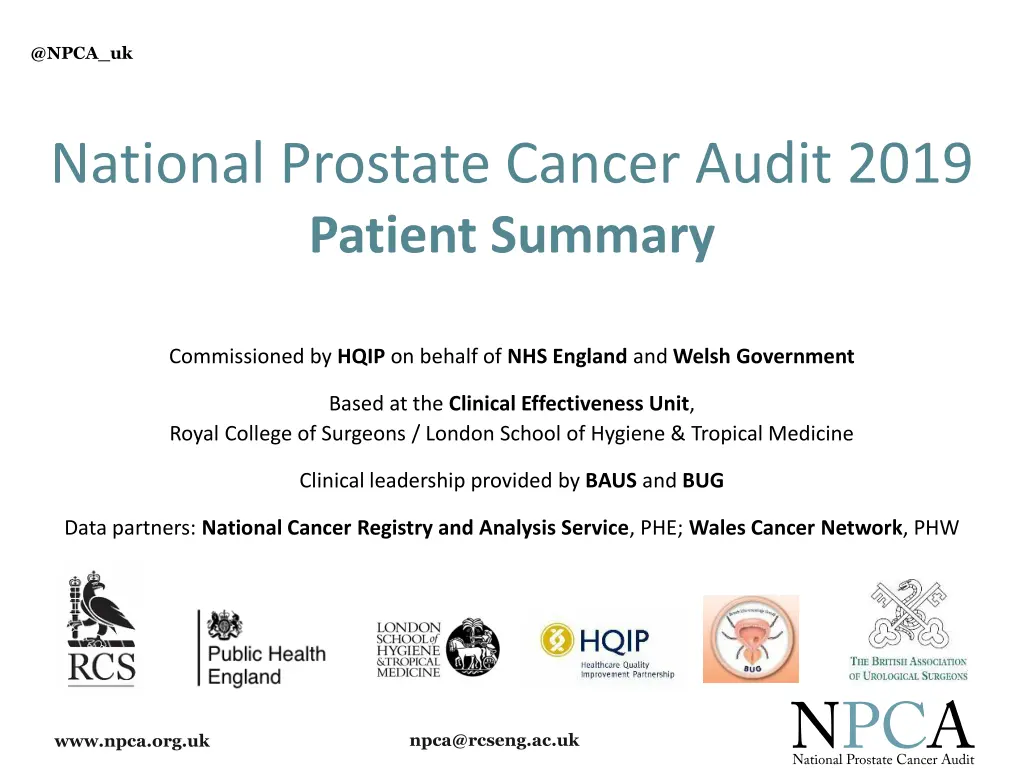
National Prostate Cancer Audit Summary 2019
A comprehensive overview of the National Prostate Cancer Audit 2019, highlighting key findings, patient characteristics, diagnosis techniques, treatments, and future recommendations for improving care. This audit, commissioned by HQIP on behalf of NHS England and the Welsh Government, collects anonymized data to assess the quality of services provided to men with prostate cancer in England and Wales.
Download Presentation

Please find below an Image/Link to download the presentation.
The content on the website is provided AS IS for your information and personal use only. It may not be sold, licensed, or shared on other websites without obtaining consent from the author. If you encounter any issues during the download, it is possible that the publisher has removed the file from their server.
You are allowed to download the files provided on this website for personal or commercial use, subject to the condition that they are used lawfully. All files are the property of their respective owners.
The content on the website is provided AS IS for your information and personal use only. It may not be sold, licensed, or shared on other websites without obtaining consent from the author.
E N D
Presentation Transcript
@NPCA_uk National Prostate Cancer Audit 2019 Patient Summary Commissioned by HQIP on behalf of NHS England and Welsh Government Based at the Clinical Effectiveness Unit, Royal College of Surgeons / London School of Hygiene & Tropical Medicine Clinical leadership provided by BAUS and BUG Data partners: National Cancer Registry and Analysis Service, PHE; Wales Cancer Network, PHW npca@rcseng.ac.uk www.npca.org.uk
@NPCA_uk Contents Information about the Audit and the Annual Report 2019 About the audit Data included and data quality Key Findings Characteristics of men who are diagnosed with prostate cancer Techniques for diagnosis Treatments received Possible complications of radiotherapy or surgery Recommendations Future plans npca@rcseng.ac.uk www.npca.org.uk
@NPCA_uk About the audit npca@rcseng.ac.uk www.npca.org.uk
@NPCA_uk Some information about the National Prostate Cancer Audit (NPCA) A national clinical audit of the quality of services and care provided to men with prostate cancer in England and Wales. Collects anonymised information from hospital records about patients treatment and outcomes (what happens after treatment) Data is analysed and compared to see if hospitals are following national clinical standards and where improvements can be made Findings are used to help define new standards and to help NHS hospitals to improve the care they provide to patients with prostate cancer npca@rcseng.ac.uk www.npca.org.uk
@NPCA_uk How is the audit carried out? The Audit is run by a team of clinicians, audit experts and cancer information specialists Data are collected from NHS Trusts and Health Boards on the diagnosis, treatment and outcomes of patients and provided to official organisations such as the National Cancer Registration and Analytical Service (NCRAS) and the Wales Cancer Network (WCN) The Audit works within strict rules covering data protection and confidentiality. Individual patients are never identified. Information on how to opt out of data collection is provided on the NCRAS website npca@rcseng.ac.uk www.npca.org.uk
@NPCA_uk Data in the audit npca@rcseng.ac.uk www.npca.org.uk
@NPCA_uk What data are reported in the NPCA? The Audit started by including men diagnosed since 1st April 2014 in England and 1st April 2015 in Wales, and has been updated each year since In the 6th Annual Report (2019), the data are from hospitals treating men who were diagnosed between 1st April 2017 and 31st March 2018 All 132 NHS Hospital Trusts in England and 6 Health Boards in Wales who provided prostate cancer services in that time submitted data to the audit The full Annual Report 2019 and Patient Summary can be found on the NPCA website npca@rcseng.ac.uk www.npca.org.uk
@NPCA_uk What data are reported in the NPCA? The data reported cover the following areas: The characteristics of men who are diagnosed with prostate cancer The techniques being used to diagnose prostate cancer Treatments that patients are receiving The possible complications of radiotherapy or surgery See the section on Key Findings for more information npca@rcseng.ac.uk www.npca.org.uk
@NPCA_uk New data in the NPCA Annual Report 2019 New for 2019 Use of docetaxel (a chemotherapy treatment) in newly diagnosed patients with metastatic prostate cancer Use of hypofractionated radiotherapy (a type of radiotherapy that delivers larger doses of radiotherapy each day over a shorter time period typically in 4 weeks) Use of high dose rate (HDR) brachytherapy (an additional treatment to supplement conventional external beam radiotherapy treatment) Update from the organisational survey of hospitals There is a full glossary of terms at the end of the Patient Summary report which gives further explanations of the clinical terms used npca@rcseng.ac.uk www.npca.org.uk
@NPCA_uk What the data quality results show The stage of prostate cancer has been well recorded General health status of patients and whether they had imaging tests to help provide their diagnoses was better recorded than previously, but remains less complete in England than in Wales Data on other investigations to help with diagnosis remain well completed in both England and Wales npca@rcseng.ac.uk www.npca.org.uk
@NPCA_uk Key Findings npca@rcseng.ac.uk www.npca.org.uk
Characteristics of men diagnosed 50% Numbers diagnosed have not increased this year 45% 45% 41% 40% 36% Most men (68% men in England, 59% in Wales) were in otherwise very good health when they were diagnosed 34% 35% 30% 25% 20% 17% 13% 15% Overall, the risk profiles of the men diagnosed with prostate cancer (shown on the right) are comparable to last year s findings 8% 10% 7% 5% 0% low risk intermediate risk localised high-risk or locally advanced metastatic England Wales
Treatments received (1) High-risk/locally advanced disease Low-risk, localised disease t * data currently unavailable in Wales Over-treatment Most men with low risk prostate cancer can be managed with active surveillance. Over- treatment is very low, seen in only 4% of men with low-risk disease Under-treatment Over two thirds of men with locally advanced prostate cancer are being treated with surgery to remove the prostate gland or radical radiotherapy techniques Potential undertreatment remains a concern, when otherwise healthy older men do not receive radical surgery or radiotherapy they might be eligible for, but are only given hormone treatments High Dose Rate Brachytherapy ( brachytherapyboost ) Some men have started being given an additional treatment to supplement their radiotherapy, which involves inserting a radioactive source directly into the prostate, but this is currently at a low level, at 5%
Treatments received (2) Intermediate-risk disease Metastatic disease * data currently unavailable in Wales Hypofractionated radiotherapy This type of radiotherapy offers safe delivery of the overall dose of radiation in fewer daily treatments. It is as effective as conventional radiotherapy, and is cheaper because it is less resource intensive. Over 90% of men with localised prostate cancer having radical radiotherapy have this treatment Docetaxel This chemotherapy treatment has recently been recommended in the NICE guidelines (May 2019) for men with newly diagnosed advanced (metastatic) disease, but who are otherwise well and without other health problems. In 2017-18, only a quarter of eligible men receive it
Possible complications 90-day readmission This is at a fairly the low level of 14% men who have surgery, and is similar across the majority of surgical centres Treatment-related genitourinary or bowel (gastrointestinal) complication e.g. diarrhoea, bleeding, infection; ulceration, and rarely, fistula formation or strictures in the bowel; narrowing or blockage of the urinary tract These complications are defined as a patient needing a procedure for any of these problems within two years of their operation or radiotherapy Fewer than 10% men who had surgery (urinary) or radiotherapy (bowel) experienced these types of complication in the two years following their treatment
@NPCA_uk Recommendations npca@rcseng.ac.uk www.npca.org.uk
Recommendations for public and patients (1) 1. Seek advice from a doctor if you experience any of the following: urinary symptoms, erectile problems, blood in your urine or persistent unexplained back pain. 2. Men with a family history of prostate, breast or ovarian cancer should consider seeking advice from their GP. 3. Men who are referred to a specialist for suspected prostate cancer should ask about whether they should have a multiparametric MRI (mpMRI) scan before having a biopsy. 4. Men with low-risk prostate cancer should be offered monitoring or active surveillance in the first instance as treatment is only needed if your cancer progresses. This protects men against the side-effects of treatment.
Recommendations for public and patients (2) 5. Men newly diagnosed with metastatic disease should be considered for chemotherapy according to new prostate cancer guidelines. 6. Men who are offered prostate cancer treatment should be made aware of the side effects of treatment including: loss of libido, problems getting or keeping erections, loss of ejaculatory function, a worsening of sexual experience, urinary incontinence and/or bowel side effects. 7. Specialist support services should be available for any man experiencing physical or psychological side effects during or following prostate cancer treatment. There should be early and ongoing access to these services, in keeping with national recommendations.
@NPCA_uk Future plans npca@rcseng.ac.uk www.npca.org.uk
@NPCA_uk Future Plans Next results (based on data up to 31st March 2019) to be published in January 2021 Further collection of patient-reported measures underway completed June 2020, to be reported January 2021 Data Improvement Leads at the National Cancer Registration and Analysis Service continue to liaise directly with providers to improve data quality data collection is due to continue during this pandemic, but we will be working with Leads to understand the impact COVID-19 may have had Maintain NPCA as a key driver of quality improvement NPCA Quality Improvement Workshop for clinicians took place in December 2019 Work with the newly-formed NPCA Patient and Public Involvement Forum to improve the work of the audit and the ways in which we disseminate information. npca@rcseng.ac.uk www.npca.org.uk
@NPCA_uk Sources of further information and support These are accessible via GP services and from prostate cancer charities including: Prostate Cancer UK www.prostatecanceruk.org Tackle Prostate Cancer www.tackleprostate.org Both of these charities operate nationwide support networks. Information can also be found from Clinical Nurse Specialists and at: NHS website www.nhs.uk/conditions/prostate-cancer/ Cancer Research UK www.cancerresearchuk.org/about-cancer/prostate-cancer Macmillan Cancer Support www.macmillan.org.uk/cancer-information-and- support/prostate-cancer npca@rcseng.ac.uk www.npca.org.uk
@NPCA_uk With thanks to our data providers at hospitals and at NCRAS and WCN to the clinicians who support our work to our newly-formed NPCA Patient and Public Involvement Forum who have given us feedback on the Patient Summary. We look forward to working with them in the future. Noel Clarke Urological Clinical Lead representing the British Association of Urological Surgeons Heather Payne Oncological Clinical Lead representing the British Uro-oncology Group and the whole NPCA team npca@rcseng.ac.uk www.npca.org.uk



